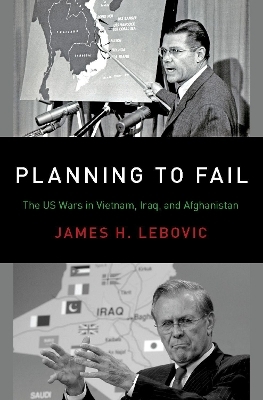
Planning to Fail
Oxford University Press Inc (Verlag)
978-0-19-093532-0 (ISBN)
In Planning to Fail, James H. Lebovic argues that a profound myopia helps explain US decision-making failures. In each of the wars explored in this book, he identifies four stages of intervention. First and foremost, policymakers chose unwisely to go to war. After the fighting began, they inadvisably sought to extend or expand the mission. Next, they pursued the mission, in abbreviated form, to suboptimal effect. Finally, they adapted the mission to exit from the conflict.
Lebovic argues that US leaders were effectively planning to fail whatever their hopes and thoughts were at the time the intervention began. Decision-makers struggled less than they should have, even when conditions allowed for good choices. Then, when conditions on the ground left them with only bad choices, they struggled furiously and more than could ever matter. Policymakers allowed these wars to sap available capabilities, push US forces to the breaking point, and exhaust public support. They finally settled for terms of departure that they (or their predecessors) would have rejected at the start of these conflicts. Offering a far-ranging and detailed analysis, this book identifies an unmistakable pattern of failure and highlights lessons we can learn from it.
James H. Lebovic is Professor of Political Science and International Affairs at The George Washington University. From spring 2015-2017, he served as chair of the International Security Studies Section of the International Studies Association. He is the author of five previous books, including Flawed Logics: Strategic Nuclear Arms Control from Truman to Obama, The Limits of US Military Capability: Lessons from Vietnam and Iraq, and Deterring International Terrorism and Rogue States: US National Security Policy after 9/11.
Chapter 1: The US Wars in Vietnam, Iraq, and Afghanistan
Chapter 2: The Vietnam War, 1965-1973
Chapter 3: The Iraq War, 2003-2011
Chapter 4: The Afghanistan War, 2001-?
Chapter 5: Three Long and Costly Wars: What Can We Learn?
References
| Erscheinungsdatum | 08.06.2019 |
|---|---|
| Reihe/Serie | Bridging the Gap |
| Verlagsort | New York |
| Sprache | englisch |
| Maße | 163 x 236 mm |
| Gewicht | 499 g |
| Themenwelt | Geschichte ► Teilgebiete der Geschichte ► Militärgeschichte |
| Sozialwissenschaften ► Politik / Verwaltung ► Europäische / Internationale Politik | |
| ISBN-10 | 0-19-093532-4 / 0190935324 |
| ISBN-13 | 978-0-19-093532-0 / 9780190935320 |
| Zustand | Neuware |
| Haben Sie eine Frage zum Produkt? |
aus dem Bereich


